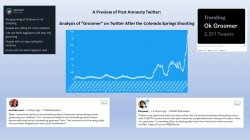Study: Use of ‘Groomer’ Hate Speech Increased on Twitter After Colorado Springs Nightclub Shooting
Posted in: School of Communication and Media News

A new study by the Joetta Di Bella and Fred C. Sautter III Center for Strategic Communication in the School of Communication and Media at Montclair State University points to what hate speech on Twitter could look like following Elon Musk’s offer of “general amnesty” to suspended accounts on the platform.
Specifically, the study showed a dramatic spike in the use of the term “grooming” (a slur used against the LGBTQ+ community) on Twitter in the period after the shooting at an LGBTQ+ nightclub in Colorado Springs, Colorado, on November 19-20. (See key findings below).
How ‘groomer’ is misused as an anti-LGBTQ slur
“Grooming,” as defined by the Rape, Abuse and Incest National Network (RAINN), is “manipulative behaviors that the abuser uses to gain access to a potential victim, coerce them to agree to the abuse, and reduce the risk of being caught.”
Historically, it’s been used as a dehumanizing slur to target, criminalize and ostracize the marginalized LGBTQIA+ community through the construction of fictional predators harming youth. Two contemporary events – the QAnon conspiracy and the discourse surrounding Florida’s “Parental Rights in Education” bill (popularly known as “Don’t Say Gay”) – echo this messaging.
As the danger of the term was more understood, social media platforms began to limit its use, including restrictions on Twitter which banned the use when directed at trans and non-binary people as an anti-LGBTQ+ slur. However, when Elon Musk took over as CEO of the platform, promising a reduction in “woke” restrictions on expression, users on the site anticipated a reduction in these sorts of constraints and an opportunity to more openly share hate content.
Highlights from the study from the School’s Center for Strategic Communication include:
- 112,140 tweets used the term “grooming” or “groomer” in the seven-day period around the attack in Colorado Springs.
- The spike in usage of the term “grooming” or “groomer” peaked after the attack with an increase of 885% over the highest point prior to the shooting.
- Potential impact for the “groomer” tweets studied was 599,575,603 with a potential reach of 390,207,542.
- Content gaining traction in terms of impact and reach included messages rationalizing physical violence in connection with this slur.
- Opposing content also gained a large share of voice, with many accounts and tweets opposing the slur attaining significant platform presence.
- There was greater negative sentiment towards use of the term “groomer” than positive sentiment, as negative sentiment towards the term was 27.6% while positive sentiment was only 9.8% in the tweets analyzed in this study.
- The tensions Twitter will navigate between content restriction and platform openness were demonstrated in data collected.
The data collected demonstrates the tensions that Twitter will navigate between content restriction and platform openness.
“We all understand the importance of freedom of speech, but there are dangers to running platforms like Twitter as a ‘free speech absolutist,” said Dr. Bond Benton, associate professor of public relations in the School of Communication and Media at Montclair State University. “It is troubling that every time there is a hate-fueled crime, those with extreme views may remain unchecked and will and have a place to spread hate speech and associated terms that demonstrate a lack of common sense, decency and compassion.”
The study was conducted by faculty Dr. Bond Benton, Dr. Yi Lu, Dr. Jin-A Choi, Dr. Keith Strudler, and Keith Green from the Joetta Di Bella and Fred C. Sautter III Center for Strategic Communication, which provides social media analytics tools and training for faculty and students for classroom learning and research projects.
###
About the School of Communication and Media: Founded in 2012, the School of Communication and Media offers a range of dynamic programs in communication and media to a talented and diverse student population of over 1,500. Offering degrees in film and television, social media and public relations, advertising, journalism and digital media, sports communication, animation and visual effects, and an MA in public and organizational relations, the School prepares the next generation of communication and media practitioners and leaders. The School houses award-winning student programs that include WMSC Radio, The Montclarion newspaper, Hawk Communications PR Agency, the Red Hawk Sports Network, Hawk+ OTT streaming platform, and News Lab, as well as the Center for Cooperative Media, which serves the public by working to grow and strengthen local journalism. Recent national School recognitions include an Edward R. Murrow Award, several Marconi Award nominations, and a College Television Award from the Academy of Television Arts & Sciences.
Contact: Keith Green, School of Communication and Media, 973-655-3701 or greenk@montclair.edu
